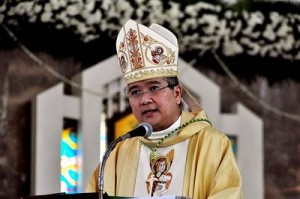LINGAYEN-Dagupan Archbishop Socrates Villegas on Thursday described as “crazy” the bill seeking to ban religious rites and images from the premises of government agencies, saying such law would make the Philippines a “soul-less” nation.
“There’s separation of church and state but there’s no separation of God and man,” said Villegas, vice president of the Catholic Bishops Conference of the Philippines (CBCP), in opposing the controversial House Bill No. 6330 or the Freedom of Religion in Government Office.
The bill was filed by Kabataan party-list Representative Raymond Palatino.
“It’s crazy because if you separate the body from the soul, what do you create? A dead man. If you separate the soul of the nation from the nation, what do you have? A dead nation,” Villegas told reporters. He added that losing our soul as a nation would be “the real downfall.”
Former CBCP president and Jaro Archbishop Angel Lagdameo earlier criticized the bill but expressed doubt whether the congressmen, most of whom are Catholics like Palatino, would pass the measure.
Pro-Life Philippines also opposed the bill, calling it unconstitutional and would “take God out of the government and in the public sphere.”
Under the bill, the conduct of religious ceremonies such as prayers, masses and other liturgical celebrations as well as he display of religious symbols would be prohibited within the premises and perimeter of offices, departments and bureaus, including publicly-owned spaces and corridors within such places.
“Take away prayers, crosses, religious signs and symbols and portraits, and take away all that remind people of God. How does that make our government officials and employees better public servants?” said Pro-Life president Eric Manalang.
Manalang said Palatino should be crafting laws that would empower the young.
The prolife movement officer said Palatino might have had a misconception about the principle of separation of Church and State that his bill aims to enforce.
He said the principle, as adapted by the framers of the Philippine Constitution, was patterned after the so-called nonestablishment clause in the United States Constitution which ensures that government will not endorse a state religion and would protect the people from the government’s interference in their chosen religion.
According to the Central Intelligence Agency Factbook, 80.9 percent or about 75.6 of the 91 million Filipinos are Catholic. Nearly nine out of 10 Catholics in Asia live in the Philippines.
Malacañang has yet to form an opinion on whether to support or thwart the bill.
“There’s still no issue because it has yet to go through the legislature. The process would still take long,” said presidential spokesperson Edwin Lacierda, adding that it would be up Congress to conduct debates on the controversial provisions of the bill.
Lacierda said the administration is waiting for legal opinions on the matter from the Office of the Solicitor General and the Department of Justice. With a report from Norman Bordadora
